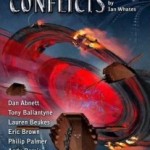Interzone 234 Reviewed
 An all-regular cast of contributors this issue; Jon Ingold, Lavie Tidhar and Suzanne Palmer start the fiction rolling, and then multiple poll winner Jason Sanford, and Hugo-winner Will McIntosh.
An all-regular cast of contributors this issue; Jon Ingold, Lavie Tidhar and Suzanne Palmer start the fiction rolling, and then multiple poll winner Jason Sanford, and Hugo-winner Will McIntosh.
Fiction
Jon Ingold’s “Sleepers” opens the proceedings with echoes of the Apollo space programme, only this time the world is in the aftermath of the first interstellar expedition to Centauri; did humanity retreat in the face of adverse local conditions, or are the mythical Centaurons real? Ingold leaves it to the reader to decide and instead concentrates on the relationship between the narrator, a priest, and the aged Jean-Luc.
I smiled the same steady smile I’d been wearing since I first took the chair across from his. My hands were folded around my beads: I usually found them to be a great comfort in the face of such decrepitude, but with Jean-Luc I pushed them around more for patience.
Recommended.
If the Ingold is elegaic, then “In the Season of the Mango Rains” by Lavie Tidhar is positively bleak. But it also harks back to an earlier age of SF, as the narrator’s lover –unable to cope with her own mortality- retreats to what the Christians call Limbo…Frozen, perfect, you’ve beaten the river…Waking, you’ll open eyes on a dying red sun, look around you at a dying Earth. SF commonly reflects humanity’s insignificance within the universe, but it’s rare to so feature our own individual mortality. Short of Effinger’s “One” it’s as unrelenting a story as I’ve read; there’s none of the usual plot comfort to be drawn from genre, but as those quotes imply, there’s a harsh beauty to be found in Tidhar’s prose as consolation. Recommended.
Suzanne Palmer
It was eight days this time, eight days pacing my cubbyhome listening to my neighbor bang around in his, like rats in bottles, waiting for the next job. When it came it was like someone had jabbed me with a knife; I jumped up and was out the door, readypack over my shoulder and flashing assignment pad in hand, before the job could pass on to someone else. If I was lucky, it’d be a multi-week assignment and I could afford to get some real food before returning home.
“The Ceiling is Sky” by Suzanne Palmer extrapolates the uncertainty of our current workplaces almost ad absurdam, as characters lie, scheme and cheat to land a contract. Nonetheless, despite the one-dimensional milieu and the crudity of villainess Tala’s depiction, the story works well, and the settings are satisfyingly otherworldly.
Jason Sanford
Jason Sanford’s latest appearance, “Her Scientifiction, Far Future, Medieval Fantasy” appears in the same issue as it’s announced that he’s topped the Reader’s Poll for a third consecutive year, and it’s easy to see why. Sanford skillfully blends disparate genres and concepts alike as the heroine of a fantasy world within an AI must overcome her limitations without alienating the audience who get to participate in setting her quest.
From Krisja’s viewpoint, it looked like her father’s knights fought valiantly against the invaders from, well, from somewhere outside the kingdom. Where exactly, Kris couldn’t say. But then so few invaders announced their origins. It simply killed the romance, claiming to be a Sir Lancelot hero when you really hailed from a Scranton or Sheboygan nowhere.
It’s a timely exploration of audience participation, given this recent article, but much more than that, it’s a terrific cross-genre story. Highly Recommended.
Will McIntosh
Few writers do Quirky Charm with one-word titles quite as well as Will McIntosh: “Bridesicle” deservedly won last year’s Short Story Hugo, but even better was “Unlikely,” which passed by almost unnoticed beneath the radar. In his latest, “Incompatible” — Leia says to Byron, whom she’s just met;
“Imagine the most terrifying thing you can. The thing that crawls in your worst nightmares, that leaves children screaming in the night because their too-open minds haven’t learned to block it out yet, and they can’t even describe it to their parents sitting at the edge of their bed, because there are no words for it, it just is.”
What precisely are the black dots that Leia sees whenever she strays too far from Power Places? The answer is unexpected, not least because McIntosh lays a number of red herrings: Outstanding.
McIntosh provides a great end to an above average issue of an above average magazine, while cover artist Richard Wagner wraps it all up in “Relics,” a suitably cross-genre cover that’s absolutely wonderful.





